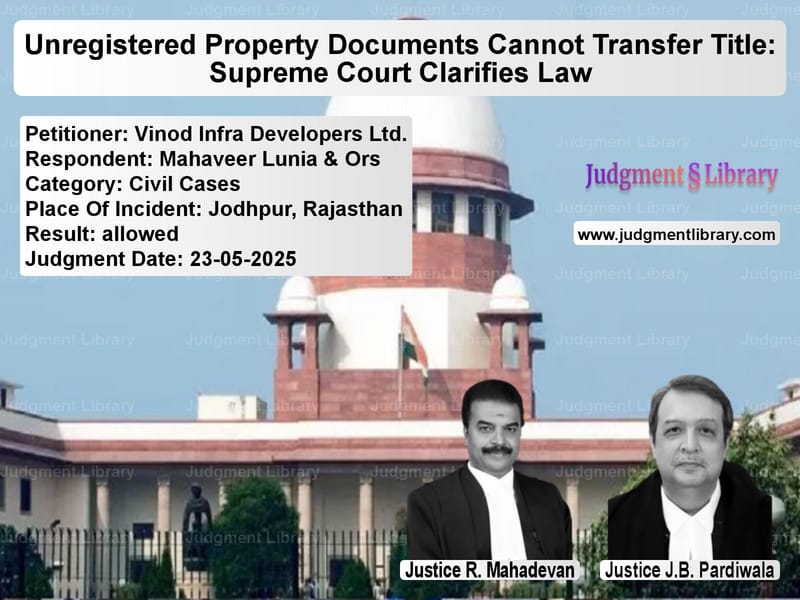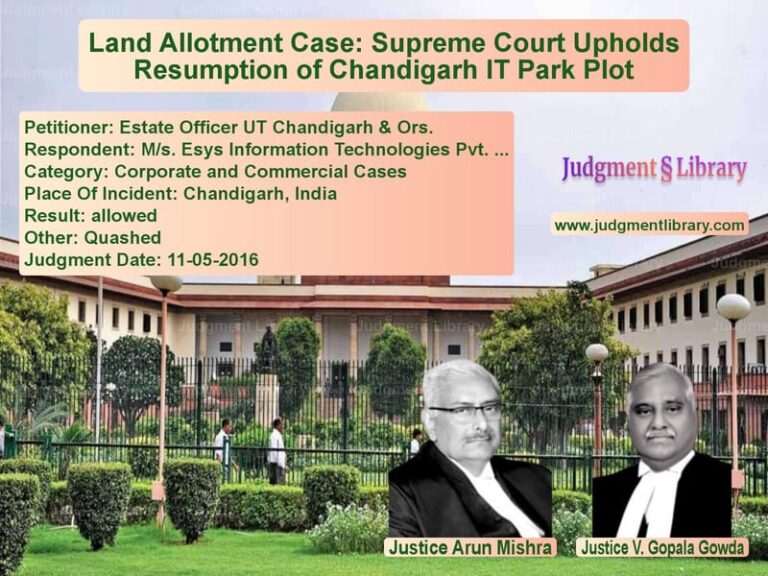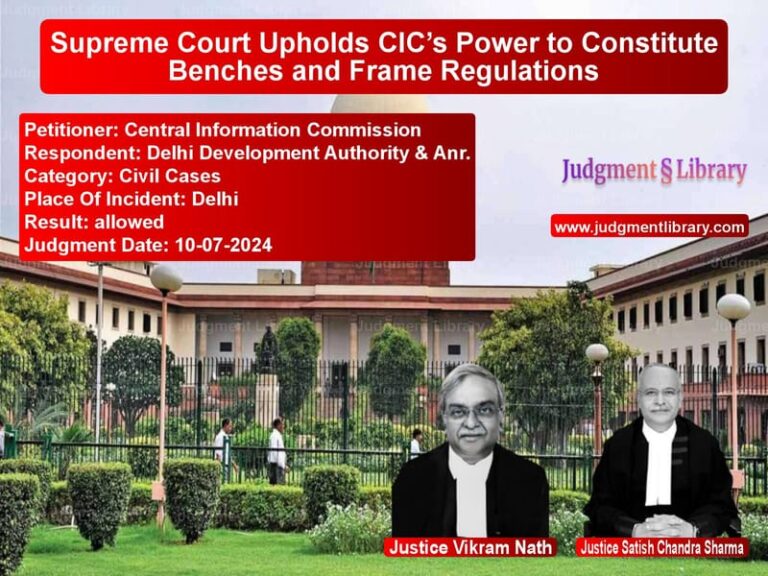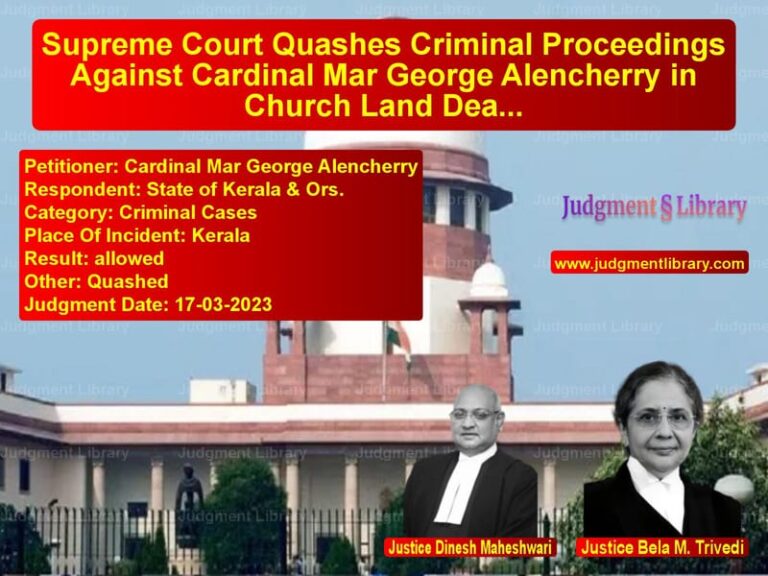Unregistered Property Documents Cannot Transfer Title: Supreme Court Clarifies Law
In a significant judgment that reinforces the fundamental principles of property law in India, the Supreme Court has delivered a crucial verdict clarifying that unregistered documents like power of attorney and agreement to sell cannot transfer ownership rights in immovable property. The case involved a complex dispute between Vinod Infra Developers Ltd and Mahaveer Lunia & Others over agricultural land in Jodhpur, Rajasthan, where the court was called upon to decide whether a plaint could be rejected at the initial stage without proper trial.
The legal battle began when Vinod Infra Developers Ltd filed a civil suit claiming that despite revoking a power of attorney given to Mahaveer Lunia, the respondent proceeded to execute sale deeds for the property. The company argued that the original transaction was essentially a mortgage arrangement for a loan of Rs. 7.5 crores, not an actual sale. However, the High Court had rejected the plaint under Order VII Rule 11 of the Code of Civil Procedure, leading to the appeal before the Supreme Court.
The Legal Battle Over Property Rights
The appellant company, Vinod Infra Developers Ltd, presented a compelling case before the Supreme Court. Their counsel argued that “the High Court erred in rejecting the plaint under Order VII Rule 11 CPC. It is settled law that a plaint can only be rejected if it is manifestly vexatious or does not disclose any right to sue.” The company emphasized that “the cause of action concerning the sale deeds dated 13.07.2022 and 14.07.2022 which were registered on 19.07.2022 subsequent to the cancellation of power of attorney, clearly raises triable issues of title and fraud, which cannot be dismissed as ‘academic’.”
The appellant’s legal team made several crucial arguments. They contended that “the suit was based on two separate and distinct causes of action: (i) the unregistered agreement to sell dated 24.05.2014 being in the nature of a mortgage; and (ii)the execution of the sale deed(s) dated 13.07.2022 and 14.07.2022, which were registered on 19.07.2022, subsequent to the revocation of the power of attorney on 27.05.2022.” They further argued that “Under sections 17, 23 and 49 of the Registration Act, 1908, an unregistered agreement to sell is inadmissible in evidence for the purpose of transferring title.”
The Respondents’ Counter-Arguments
On the other side, Mahaveer Lunia and other respondents presented a different perspective. Their counsel submitted that “All documents executed between the parties, including the agreement to sell dated 24.05.2014, clearly reflect a sale transaction. There is no reference to a mortgage or loan in any document between 2014 and 2022.” They characterized the appellant’s claim as an afterthought, stating that “The claim that the transaction was a mortgage is an afterthought, introduced only at the time of filing the civil suit in November, 2022.”
The respondents also raised jurisdictional issues, arguing that “As per Section 207 of the Rajasthan Tenancy Act, 1955, suits relating to khatedari rights and recovery of possession based on tenancy or mortgage issues fall within the exclusive jurisdiction of the revenue courts.” They maintained that the High Court had correctly exercised its jurisdiction in rejecting the plaint at the threshold.
The Supreme Court’s Legal Analysis
Justice R. Mahadevan, writing the judgment for the bench comprising himself and Justice J.B. Pardiwala, delivered a comprehensive analysis of the legal principles governing property transactions. The Court firmly established that “the position of law is that rejection of a plaint under Order VII Rule 11 CPC is permissible only when the plaint, on its face and without considering the defence, fails to disclose a cause of action, is barred by any law, is undervalued, or is insufficiently stamped.”
The Court extensively examined the provisions of the Registration Act and Transfer of Property Act, citing precedent after precedent to reinforce the fundamental principle that unregistered documents cannot transfer property rights. Quoting from S. Kaladevi v. V.R. Somasundaram, the Court emphasized that “Section 17 of the 1908 Act is a disabling section. The documents defined in clauses (a) to (e) therein require registration compulsorily. Accordingly, sale of immovable property of the value of Rs.100 and more requires compulsory registration.”
The judgment further elaborated that “Section 49 gives teeth to Section 17 by providing effect of non-registration of documents required to be registered. Section 49 reads thus: ‘S.49. Effect of non-registration of documents required to be registered.- No document required by Section 17 or by any provision of the Transfer of Property Act, 1882 (4 of 1882), to be registered shall- (a) affect any immovable property comprised therein, or (b) confer any power to adopt, or (c) be received as evidence of any transaction affecting such property or conferring such power, unless it has been registered.'”
Critical Examination of Property Transfer Mechanisms
The Supreme Court conducted a thorough examination of various property transfer mechanisms, particularly focusing on the legal status of power of attorney and agreement to sell. Quoting from the landmark case of Suraj Lamp & Industries (P) Ltd. v. State of Haryana, the Court reiterated that “Section 54 of TP Act makes it clear that a contract of sale, that is, an agreement of sale does not, of itself, create any interest in or charge on such property.”
The judgment provided crucial clarity on power of attorney transactions, stating that “A power of attorney is not an instrument of transfer in regard to any right, title or interest in an immovable property. The power of attorney is creation of an agency whereby the grantor authorizes the grantee to do the acts specified therein, on behalf of grantor, which when executed will be binding on the grantor as if done by him. It is revocable or terminable at any time unless it is made irrevocable in a manner known to law. Even an irrevocable attorney does not have the effect of transferring title to the grantee.”
In a significant conclusion, the Court affirmed that “It is thus clear that a transfer of immovable property by way of sale can only be by a deed of conveyance (sale deed). In the absence of a deed of conveyance (duly stamped and registered as required by law), no right, title or interest in an immovable property can be transferred.”
The Court’s Final Ruling and Directions
The Supreme Court found that the High Court had committed a fundamental error in rejecting the plaint. The Court held that “the High Court erred in treating the second cause of action – pertaining to the sale deeds registered on 19.07.2022 – as merely ‘academic’, and proceeded to reject the plaint in its entirety without undertaking a judicial examination of this distinct issue.”
Quoting from Central Bank of India v. Prabha Jain, the Court emphasized that “Even if we would have been persuaded to take the view that the third relief is barred by Section 17(3) of the SARFAESI Act, still the plaint must survive because there cannot be a partial rejection of the plaint under Order VII, Rule 11 of the CPC. Hence, even if one relief survives, the plaint cannot be rejected under Order VII, Rule 11 of the CPC.”
The Court also addressed the issue of court fees, noting that “the suit cannot be dismissed merely on the ground of insufficient court fee. The law mandates that the plaintiff be afforded an opportunity to rectify such deficiency. Only upon failure to comply, can the plaint be rejected.”
In its final ruling, the Supreme Court allowed the appeal and set aside the High Court’s order. The Court directed that “the plaint is directed to be taken on the file of the trial Court, which shall proceed with the suit in accordance with law, uninfluenced by any observations made in this judgment.” This means the case will now go back to the trial court for a proper examination of all the factual and legal issues raised by both parties.
The judgment serves as a crucial reminder of the fundamental principles governing property transactions in India and reinforces the importance of proper registration for transferring immovable property rights. It also establishes clear boundaries for the exercise of power under Order VII Rule 11 CPC, ensuring that plaintiffs get a fair opportunity to present their case unless the plaint is completely devoid of any cause of action.
Petitioner Name: Vinod Infra Developers Ltd..Respondent Name: Mahaveer Lunia & Ors.Judgment By: Justice R. Mahadevan, Justice J.B. Pardiwala.Place Of Incident: Jodhpur, Rajasthan.Judgment Date: 23-05-2025.Result: allowed.
Don’t miss out on the full details! Download the complete judgment in PDF format below and gain valuable insights instantly!
Download Judgment: vinod-infra-develope-vs-mahaveer-lunia-&-ors-supreme-court-of-india-judgment-dated-23-05-2025.pdf
Directly Download Judgment: Directly download this Judgment
See all petitions in Property Disputes
See all petitions in Contract Disputes
See all petitions in Judgment by R. Mahadevan
See all petitions in Judgment by J.B. Pardiwala
See all petitions in allowed
See all petitions in supreme court of India judgments May 2025
See all petitions in 2025 judgments
See all posts in Civil Cases Category
See all allowed petitions in Civil Cases Category
See all Dismissed petitions in Civil Cases Category
See all partially allowed petitions in Civil Cases Category







